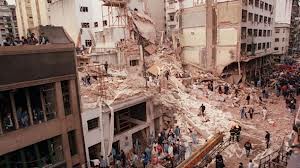 An Argentinean lawmaker has described as “essential” an agreement reached between Iran and Argentina to find the truth about the 1994 deadly bomb attack on the Jewish community center in Buenos Aires.
An Argentinean lawmaker has described as “essential” an agreement reached between Iran and Argentina to find the truth about the 1994 deadly bomb attack on the Jewish community center in Buenos Aires.
“The agreement is essential to the people of Argentina because we have a responsibility with the victims and their families. We have a debt with the truth,” a member of Argentina’s New Encounter Party, Carlos Rainmundi, told Press TV.
Tehran and Buenos Aires signed a memorandum of understanding in January to jointly probe the 1994 bombing of the Argentine Israelite Mutual Association (AMIA), which killed 85 people and wounded 300 others.
“The memorandum of understanding establishes a truth commission of independent experts proposed by both countries who will be neither from Argentina, nor from Iran. It is an interesting non-legal alternative to know the truth,” said Leah Tandeter, a human rights lawyer with Amnesty International,.
“In Amnesty International, we think the memorandum of understanding is an opportunity. It will allow carrying out pending judicial processes that are indispensible to move on such as the possibility of questioning Iranian officials,” she added.
Numerous ceremonies have been held in Argentina to commemorate the 85 victims who lost their lives at the AMIA.
However, Argentina’s President Cristina Fernandez de Kirchner did not attend a rally organized by AMIA.
She has vowed that her administration “would not allow the AMIA tragedy to be used as a chess piece in the game of faraway geopolitical interests.”
Under intense political pressure from the US and Israel, Argentina had previously accused Iran of having carried out the bomb attack. The Islamic Republic has categorically denied any involvement in the terrorist bombing.
In July, Washington reacted fiercely when Argentina prevented AMIA case special prosecutor Alberto Nisman from taking part in a US Congress meeting to level allegations against Iran.
Nisman had collected a 500-page indictment in which he accused the Islamic Republic of “infiltrating” regional countries to spread an “intelligence network.”
By Press TV
The Iran Project is not responsible for the content of quoted articles.

 QR code
QR code